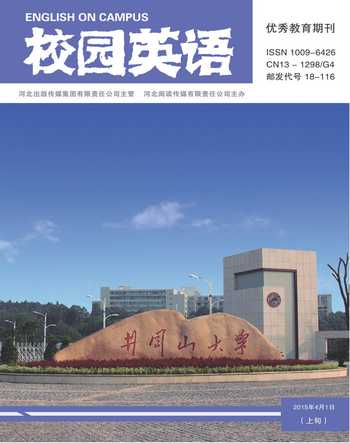Disciplinary integration into English teaching from the student’s perspective
湯熙 姚燁
【Abstract】This report is based on a survey of a Jiangsu college students innovation and entrepreneurship project which accessed 858 respondent questionnaires and interviews with 46 students from 30 undergraduate programmes at 4 applied higher education institutions.The research aims to investigate university students' perception and anticipation of disciplinary integration into university English classrooms.
【Key words】disciplinary integration; English teaching; higher education
College English teaching has been criticised by university student respondents for its drawbacks such as overlooking language learners' eventual uses in the target language,overemphasising fragmented examples of sentence level usage,and overreliance on metacognitive strategy rather than students basic language skills (Zhang,2004).These deficiencies,as articulated by interviewees,could lead to learners' demotivation and cognitive inability to comprehend the ‘input of relevant content to facilitate high-level language proficiency
A lack of overlapping disciplinary cultures and the conflicts between different subjects make the previous language courses for communicative purposes inadequate in terms of contributing to the pedagogical effectiveness of multidisciplinary literacy practices in classrooms.These second language learners,albeit with a certain level of general communicative competence,are required to develop more comprehensive and diversified literacies such as the disciplinary expertise and analytical skills to deal with the complexity and heterogeneity across different disciplinary cultures.Although there has been an increasing awareness of genre and disciplinary analysis in academic discourses,the danger of current consistently agreed ‘academic literacies lies in their overreliance on the ‘common core which is thought to be universal and transferable across disciplines.This single and uniform academic core,as Bhatia (2004) cited Hylands (2000) comment on the current writing programmes in the academy,leads to the risk of camouflaging disciplinary variability and disguising academic writing as ‘naturalised,self-evident and non-contestable ways of participating in academic communities.
According to respondents,although discipline-specific language courses have been advocated,given that the generalisation across genres and disciplines becomes increasingly problematic in traditional academic literacy programmes,the role of disciplinary variation still takes ‘a back seat (Bhatia,2004) in university English classrooms.Those one-size-fits-all ‘economical,convenient and cost-effective (Bhatia,2004) language-based teaching takes a prevalent position across the applied institutions of higher education.However,such an ‘academic core is often adopted in favour of pedagogical convenience for the design and delivery of language programmes,rather than established on its pedagogical benefit for literacy practices.Despite the existence of generic overlaps across disciplinary boundaries,these genres display subtle variations as to how lexico-grammatical resources and rhetorical strategies make sense of disciplinary concepts,knowledge structures,and pedagogic approaches.The existent generic and disciplinary conflicts in a variety of science and arts disciplines may in turn set barriers for those second language learners with limited language competence when they face the complexity across disciplinary boundaries.
In conclusion,differences in disciplinary culture range from specialised lexis and knowledge structures to forms of enquiry.These considerations from university student respondents call for the language teaching community to investigate subject-specific communicative demands and devise more effective language programmes for specific disciplines.
References:
[1]Hyland, K.(2000) Disciplinary discourse: Social interactions in academic writing, Harlow: Pearson Education Ltd.
[2]Bhatia, V.K.(2004) ‘Academic literacy in higher education, in Wilkinson R.(Ed.) Integrating Content and Language: Meeting the challenge of a multilingual higher education, Netherlands: Universiteit Maastricht.
[3]Zhang, H.(2004) Strategies, approaches to learning, and language proficiency as predictors of EFL reading comprehension, unpublished Masters of Education thesis.Kingston, Ontario: Queens University.
- 校園英語·上旬的其它文章
- Green Design—the Development direction of Industrial design
- 安吉拉·卡特《明智的孩子》私生主題的女性主義研究
- 葛浩文英譯《紅高粱家族》之適應與選擇
- Research on the Application of Chinese Traditional Culture Art Elements in Modern Graphic Design
- Analysis of Gender Differences in Color Reaction in TV Show You Are the One
- Multiple Roles of Secretaries

